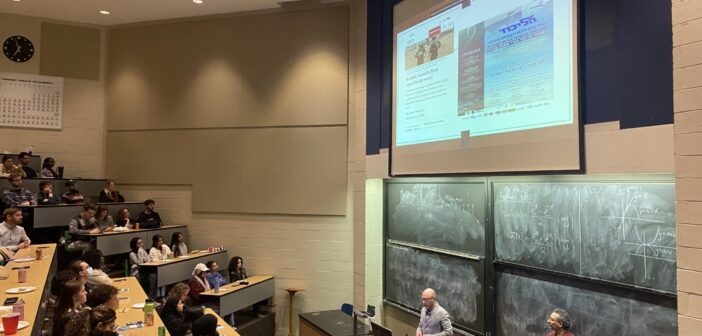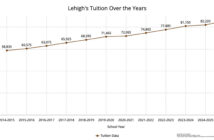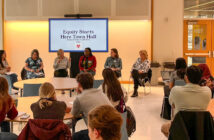Editor’s Note: This article has been updated to reflect more precise language regarding the ongoing conflict in Gaza.
Lehigh’s Student Political Action Coalition (SPAC) hosted an educational panel and discussion titled “One Year of Genocide in Gaza” in Neville Hall on Nov. 17. The event was the first discussion held this semester aiming to educate Lehigh community members about the lives lost in Gaza.
The event featured presentations from Nitzan Lebovic, the chair of holocaust studies and ethical values, and Faramarz Farbod, a professor of political science at Moravian University. The presentations were followed by a Q&A session with the speakers during which participants could submit anonymous questions through a QR code.
The event was open to the public, and there were nearly 100 people in attendance, including Lehigh students, faculty and staff, residents of Bethlehem and individuals from neighboring universities.
Layan Suleiman, ‘25, a member of SPAC, was one of the organizers of the event. She said it’s important to host events like this to allow different perspectives to shine.
Suleiman said the event took three and a half weeks to plan, which included selecting the right speakers for the panel.
“Asking (Lebovic) to speak was kind of a no-brainer,” Suleiman said. “(Farbod) spoke at a Lehigh event last semester, and he offered an unfiltered perspective. I figured that might be good.”
During his presentation, Lebovic defined the concept of genocide and explained the history behind the term. He said members of his family were victims of the Oct. 7 attacks.
Lebovic said the universal term of genocide is “certain acts committed with the intent to destroy in whole or in part, a national, ethnical, racial or religious group.”
Farbod spoke about the colonization and long-standing oppression of Palestinians, and he said the majority of Palestinians have been struggling for multiple decades.
“Palestinians want a dignified life, and they want freedom,” Farbod said.
Farbod also said Palestinians want an end to an apartheid system.
Lebovic also said proper dialogue is important when discussing the events occurring in Gaza and Israel.
He said members of the Lehigh community should realize the way to bridge over violence and division, and be better Democrats and dialogue partners, is to understand the pain of the other on equal terms and on the other’s terms.
“That means understanding that another perspective may be uncomfortable, but that does not make it illegitimate,” Lebovic said.
Suleiman said she attempted to further this dialogue in the event’s Q&A session, during which 33 questions were submitted.
She said she selected the questions that she felt sparked conversation or would be challenging for the speakers to answer to hear meaningful responses.
The other event organizers, Dylan McFarland, ‘25, and Sarah Stevens, ‘26, discussed the importance of engaging with the greater Lehigh Valley community to share resources, information and events.
“In reality, no movement is confined to a single campus, to a single amount of geography, and there is no such thing as an outside agitator,” McFarland said.
Stevens said there was no specific goal for the event, but it was a success in getting people of differing opinions to talk about a difficult subject.
“These discussions are a step in the right direction, but we’ll continue to host events that are educational,” Stevens said.






Comment policy
Comments posted to The Brown and White website are reviewed by a moderator before being approved. Incendiary speech or harassing language, including comments targeted at individuals, may be deemed unacceptable and not published. Spam and other soliciting will also be declined.
The Brown and White also reserves the right to not publish entirely anonymous comments.
9 Comments
Occupation…genocide ….Are you people kidding me? Hamas started the holocaust and Israel is responding in kind. How do you respond to a group who’s mission is to wipe you off the map? How do you respond to the people of Gaza, Lebanon and Iran who want to kill every Jew within the region? You know the sad thing about LU is that they are always a day late and a dollar short behind the Ivy’s…who by the way have a history of antisemitism. Shame on you. Shame on the administration for allowing such hatred. You guys kid yourselves as to being forward thinkers….you’re retrograde at best.
Dear NJCJR- I applaud your letter and fully agree with every word you wrote… especially the “Shame on the Brown & White” part. Thanks
Although I do not agree with the positions presented in the forum, I respect the fact that there is a place for different views on specially on a university campus.
What disappoints me is that journalists are not to take sides in reporting events. The fact that the author declares in the first paragraph that there has been genocide is inexcusable. It is also completely absurd that there is no mention of the brutal and barbaric attack that took place on October 7th.
I expect more from the Brown and White which I have been reading for 40 years.
Alan, well said! It is clearly intentional to leave out the Hamas Terrorist atrocities of Oct 7. Shame on the Brown & White!
I am bewildered by the quality of “journalism” in this “article.”
The covered event is described as a “panel and discussion,” but the article presents only one side of a discussion. Either the author failed to describe all sides of the event’s discussion that transpired (from both the presenters and the 33 Q&A participants) or if they reported the substance of the event as it occurred, they failed to perform their journalistic duty to fact-check the presented information, including the points of view expressed at the event.
When the definitions of genocide, colonization, and apartheid are considered in the context of Palestinian history, past and present, the terms are erroneously invoked; I would have expected the article’s author to note such.
The article indicates that one of the event organizers noted, “…there was no specific goal for the event.” If there was no goal, why was it organized, why did speakers agree to participate, why did 100 people show up, why did attendees submit questions, and why did The Brown & White cover it? I contend that SPAC had goals of spreading disinformation and presenting opinion as alleged fact. Too bad the The Brown & White failed in its goals of exercising something called quality journalism.
Note for the record, I also wish for a “dignified life and freedom” for the Palestinians, as included in the article – I also wish Palestinian leadership would have “beat their swords into plowshares and their spears into pruning hooks” effective November 29, 1947 (when the United Nations adopted Resolution 181); in the words of John Lennon, “Imagine.”
These comments are all the proof needed to show this event was imperative to the campus community. SPAC was brave putting this together, as were the participating professors. Thank you, Brown and White, for covering it to the best of your ability.
Sara, I think you are missing the point or missing your basic morals. I suggest you watch this movie to understand what was missing in this article: Here’s the trailer to October H8te:
Thank you
Dave, Well said! Thank you for the clear letter. I agree with your letter. Thank you for standing strong with good morals.
Thanks for sharing your insightful thoughts. The term “genocide” is understandably provocative, and it’s crucial to unpack what it really means in this context.
The event made strong references to the idea of genocide in Gaza, but the way it was framed missed some important context. As you rightly pointed out, genocide is a very specific legal term that refers to acts committed with the intent to destroy, in whole or in part, a national, ethnic, racial, or religious group. It’s a serious accusation, and it’s important to be careful about how it’s used in such a complex conflict.
One significant point missing from the event and the article is the history of Israeli peace overtures, which have been rejected by Palestinian leadership multiple times. Whether it was during the Oslo Accords, the 2000 Camp David Summit, or other initiatives, Israel has made attempts to negotiate peace. These efforts are essential to understanding the larger picture, and it’s a missed opportunity that the event didn’t address them. If the Palestinian leadership had accepted these peace offers, the situation might have been very different.
The current escalation in Gaza also started with the horrific October 7 attack, in which Hamas militants killed over 1,200 Israelis and took hostages, including American citizens. The war could have ended that day if Hamas had simply surrendered and released the hostages, yet this critical point was left out of both the event and the article. The fact that several of these hostages are American citizens adds another layer to the tragedy, and it’s something that deserves more attention in any discussion of the conflict.
The event also highlighted the history of Palestinian displacement and mentioned the idea of “incremental genocide,” but it didn’t provide the full context. For example, the 1948 Palestinian exodus is often cited as evidence of genocide, but the reality is that many Palestinians left voluntarily or under pressure from Arab leaders, rather than being forcibly expelled by Israel. This distinction is important because it changes how we understand that period.
Additionally, the idea of “incremental genocide” doesn’t align with the population growth we’ve seen in Gaza and the West Bank. The Palestinian population has increased significantly over the years. If Israel were really pursuing a genocidal agenda, we’d expect to see a decrease in the population, not the growth that’s actually occurred. This is a key point that the event didn’t really engage with, and it’s important when discussing these serious accusations.
This is a complicated issue, and a more balanced discussion is needed. By acknowledging the full history, including Israel’s peace efforts and the violent actions of Hamas, we can better understand where we are today and have a more informed, productive conversation.